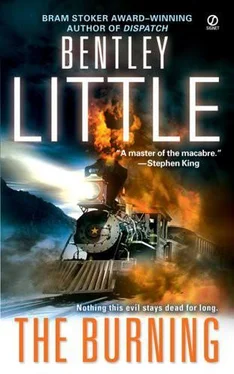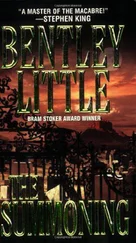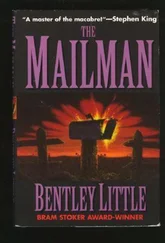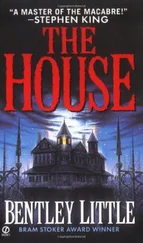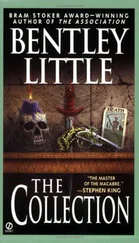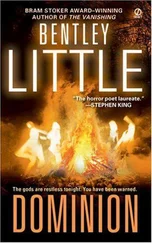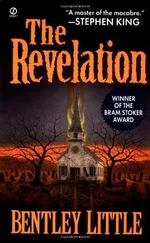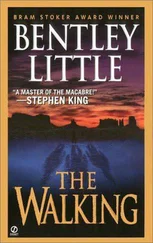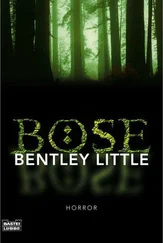Prologue
The Man from the Government stood at the edge of the windswept plain and stared out at the carnage before him.
It was far, far worse than he'd been led to believe. He'd been told the numbers, even had in his courier pouch a description of the worst atrocities, but there was no way that the scope of the massacre could have been conveyed by mere words.
Hardened though he was, he was forced to glance away, looking out beyond the bodies. To the north, he saw barren ground broken by occasional scrub brush. To the south, a series of small hills, beyond which was the lake. Overhead, the sky was full of clouds, their white innocence contrasting sharply with the rent flesh on the field below.
Girding himself, the Man allowed his gaze to fall once again upon the ground. The bodies-or body parts --lay strewn in every conceivable position, stacked several deep, human mixed with horse, testifying to the unbridled ferocity of the slaughter. Fingerless hands on the ends of severed arms emerged from the rotting viscera of gutted torsos; butchered legs rested atop mutilated man faces and hairy horse heads. The soil had been stained a deep dark crimson, but it was obvious that before the blood had sunk into the ground, there had been pools, rivers, lakes of it, blood so thick the red tide would have reached halfway up his boots.
As terrible as the sight was, the smell was a thousand times worse, an overwhelming stench of death and decomposition, shit and spoilage, piss and putrefaction.
The only noise on the plain was the cawing of carrion birds and the buzzing of flies, both so loud and overpowering that it was nearly impossible for him to maintain a coherent train of thought.
It was his job to scout the location, however, to determine what was needed and then report back. Holding his breath, the Man stepped forward, attempting to pace off the dimensions of the massacre site, though it was impossible to walk a straight line through the jumble of mangled corpses and the constant startled flight of birds and bugs. He advanced carefully, wincing as he trod upon a man's detached genitals, nearly slipping in a still-sticky patch and pitching forward into a battered chest cavity, saving himself only by crunching a skull with his right boot.
This would not be easy work. The crew would have to be much larger than originally anticipated, and once they were through, their silence had to be assured. If any of this ever got out ...
But of course it would not get out. President Grant had given strict orders that everything was to be conducted with the utmost secrecy, knowledge restricted to a very few, and it was the Man's duty to carry out the president's wishes and make sure that everything went as planned. Congress was watching Grant like a hawk, but out here in the wilderness there were no overseers and there was still some discretion. The president could deal with the situation in his own way.
Because General Grant knew war.
He knew bloodshed.
He knew horror.
He knew how to handle this.
The Man from the Government kept pacing, marking off measurements. He worked as fast as he could, but it was still close to sundown before he finally made his way back to his horse and took off across the countryside the way he had come.
He returned a month later, after the cleanup, after the bonfire. \
Bone fire.
It was the only way to dispose of the evidence, but smoke from the burning bodies had been visible for fifty miles, the foul-smelling black soot falling on homesteads more than a day away. They'd had to post a perimeter of guards to keep away people from the city curious to discover what was happening.
Other than that, though, the cleanup had gone well, and indeed, upon inspection, there appeared to be no evidence of the terrible events that had occurred on this spot. Holding his hat so it would not be blown off, the wind whipping his coattails, the Man from the Government strode over the ground, examining it as he went. He thought that at one point, near a patch of mud, the soil appeared redder than it should, but the variation in hue was so slight that it would be noticed only by someone specifically looking for it.
He was not slow, but he was methodical, and by the end of the afternoon, he was satisfied that any crisis had been averted, that there was no evidence anything out of the ordinary had occurred here.
He climbed upon his horse. It was a two-hour ride back to camp, another two days to a telegraph office. It was fortunate that the atrocity had happened here, far from civilization and the prying eyes of humanity.
He might not return to his camp and his aides until after nightfall, but that inconvenience was a small price to pay for the ease of completing this mission, which could have been so much more difficult.
Tomorrow, they would pull up stakes, and once he reached the telegraph office on Friday, he would cable to Hogue, who would inform the president that all was right, that the field had been successfully cleaned and cleared.
They were safe.
At least for now.
One
Flagstaff, Arizona
Angela Ramos stood in line in front of the university's housing office and, for the fourth time in ten minutes, looked at her watch. The line had not moved. Oh, there'd been a barely perceptible shift forward, but it was the result of students shuffling their feet, closing spaces, pressing ahead incrementally in the hope that it would somehow spur the workers in the office to speed up, and not the result of genuine progress.
She was here because she'd been promised on-campus housing, and she held in her hand a computer-printed form stating exactly that. But when she'd arrived and checked in at Admissions and Records, Angela had received notice that, due to overenrollment this semester, she would not be able to stay in one of the dorms. Preference had been given to upper-classmen and returnees, and spaces for freshmen were allotted based on distance from home. As a student from California, she hadn't traveled far enough to merit accommodations.
This is totally unacceptable, she planned to say when she finally reached the head of the line and got a chance to confront someone from the housing office. In her mind her voice came out firm, resolved and authoritative. She saw herself meeting the eyes of her nemesis and not backing down. It never worked out that way in real life, though, which was why she was using this time to prepare and practice the speech she would give to the university automaton she would have to face.
A kid about her age with a huge halo of retro hair who'd been walking down the sidewalk toward the back of the line stopped when he saw how many students were already ahead of him. "How long have you guys been standing on line?" he asked in a thick New York accent.
"A half hour," a clean-cut young man two spaces in front of her answered.
"Shit," the hairy guy said, and walked away.
Angela watched him go. Why, she wondered, did people from the East Coast say "on line" instead of "in line"? People in a queue weren't standing on a line. They were the line. The line consisted of the people in it.
Already she was getting annoyed by differences in speech patterns?
This was going to be one long afternoon.
It was one long afternoon. Either everyone in front of her had unbelievably complicated problems or the people who worked in the housing office were totally incompetent. By the time she was inside the building and at the front desk, her righteous diatribe had been honed to perfection. After hearing a brief outline of Angela's problem and determining that it wasn't the fault of misfiled paperwork, the secretary at the counter instructed her to go down the hall to office 1A and speak to a housing administrator.
Читать дальше
